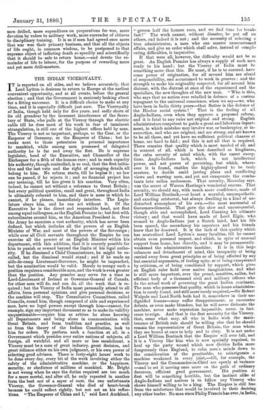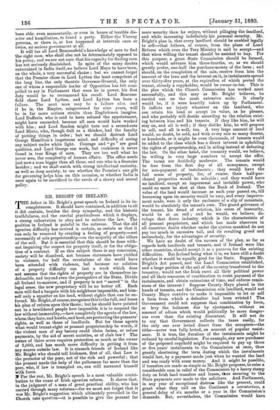THE INDIAN VICEROYALTY.
IT is reported on all sides, and we believe accurately, that Lord Lytton is desirous to return to Europe at the earliest convenient opportunity, and at all events, before the general election ; and that the Government is anxiously looking about for a fitting successor. It is a difficult choice to make at any time, and it is especially difficult just now. The Viceroyalty of India, though held only for five years, and sadly shorn of its old grandeur by the incessant interference of the Secre- tary of State, who pulls at the Viceroy through the electric cable till he does most of his work in fear of imminent strangulation, is still one of the highest offices held by man. The Viceroy is not so important, perhaps, as the Czar, or the Emperor of Germany, or the Emperor of China ; but he ranks next to those potentates in personal importance to mankind, while among men possessed of delegated authority he is far and away the first. He is supreme legislator, head of the Executive, and Chancellor of the Exchequer for a fifth of the human race ; and in each capacity his authority, though controlled, is so real, that the first initia- tive and the last veto and the right of arranging details all belong to him. No reform starts, till he begins it ; no law can be passed, if he rejects it ; and no financial project has any meaning, till he has given it his sanction. Very often, indeed, he cannot act without a reference to Great Britain ; but every political question, small and great, throughout India is ultimately referred to him, and there is none in which he cannot, if he pleases, immediately interfere. The Legis- lature obeys him, and he can act without it. Of the Executive he is the direct and responsible head, not first among equal colleagues, as the English Premier is; but first with subordinates around him, as the American President is. Over the Army he exercises a vast authority, which has never been defined, but which includes all the powers of an English Minister of War, and most of the powers of the Sovereign ; while over all Civil servants throughout the Empire he can exercise all the powers of an English Minister within his department, with this addition, that it is scarcely possible for him to punish or reward beyond the limits of his legal autho- rity. If he dismissed a Chief Commissioner, he might be re- called, but the dismissal would stand ; and if he made an aide-de-camp Lieutenant-Governor, he might be impeached, but the nomination would be valid. Merely to occupy such a position requires a considerable man, and the work is even greater than the position. Any grandee may serve for a time as Lord-Lieutenant of Ireland or Governor-General of Canada, for other men will do, and can do, all the work that is re- quired; but the Viceroy of India must personally attend to all affairs, form personal opinions, and give personal decisions, or
the machine will stop. The Consultative Committees, called Councils, round him, though composed of able and experienced men, have no legal powers except through him—cannot, for example, sign any important document so as to make its validity unquestionable—require him as arbiter, he alone knowing all Departments and being alone in communication with Great Britain, and from tradition and practice, as well as from the theory of the Indian Constitution, look to him for orders. To perform such a function at all, in a Government which presides over entire nations of subjects, all foreign, all watchful, and all more or less recalcitrant, a Viceroy must be a man of great industry, great decision, and great reliance either on his own judgment, or his own power of selecting good advisers. There is forty-eight hours' work to be done every day, every bit of the work involving either the safety of the administrative machine, or the happiness, security, or obedience of millions of mankind. Mr. Bright is not wrong when he says the duties required are too much for a mere mortal, and after all, he only repeated in another form the best mot of a sayer of mots, the one unfortunate Viceroy, the Governor-General who died of heart-break because he could reflect rightly, but not act on his reflec- tions. "The Emperor of China and I," said Lord Auckland, "govern half the human race, and we find time for break- fast I" The work cannot, without disaster, be put off on others, and indeed it is not ; and the necessity of selecting a true administrator, a man who can master unaccustomed affairs, and give an order which shall solve, instead of compli- cating difficulties, is imperative.
If that were all, however, the difficulty would not be so great. An English Premier has always a supply of such men ready to his hand ; but the Viceroy of India must be something more than this. He must, if he is to succeed, have some power of origination, for all around him are afraid
of responsibility, and accustomed to work in grooves ; and the strength to make his originality respected, for all around him distrust, with the distrust at once of the experienced and the specialists, the new thoughts of the new man. " Who is this, who says that no nation ever rebelled in defence of a custom repugnant to the universal conscience, when we say—we, who have been in India thirty years—that Suttee is the defence of the Hindoo social system ? " That is the feeling of all Anglo-Indians, even when they approve a proposed reform, and it is fatal to any ruler not original and strong. English administrators competent to guide a great and laborious depart- ment, in which mistakes may involve war, or bankruptcy, or in- surrection, and who are original, and are strong, and are known to be all these, and yet have no sufficient political chances at home, are hard to find ; and this is not all that is required.
There remains that quality which is most needed of all, and is scarcest of all, which is best described as kingliness, the calm serenity of mind which, with the rarest excep- tions, Anglo-Indians lack, which is not intellectual power, and not power of governing, but which, where- ever it is found, enables the highly-placed to be truly masters, to decide amid jarring plans and conflicting views and warring men, and yet not exasperate the comba- tants into sullen uselessness. That serenity, Macaulay says, was the secret of Warren Hastings's wonderful success. That serenity, we should say, with much more confidence, made of Lord William Bentinck,—at heart a scornful, unsympathetic.
and exacting aristocrat, but always dwelling in a kind of un- disturbed atmosphere of his own,—the most successful of Governors-General. That gave the slow and unresourceful, though able and accomplished, Lord Canning his ultimate victory ; and that would have made of Lord Elgin, who seemed to Anglo-Indians just a Scotch laird, had his life been spared, the ascendancy his superiors and his friends knew that he deserved. It is the lack of this quality which has neutralised Lord Lytton's many faculties, till he cannot obtain even personal respect, and which, in spite of unusual support from home, has directly, and it may be permanently.
weakened the administrative machine. It is in this large calmness and detachment of mind, this incapacity of being carried away from great principles or of being affected by any but essential arguments, of feeling spite, or of being exasperated by criticism, or of being conciliated by support, which gives an English ruler hold over native imaginations, and what is still more important, over the proud, sensitive, sullen, but efficient body of a thousand civil and military officers who do the actual work of governing the great Indian continent. The man who possesses that quality, which in home administra- tion is rarely found, and still more rarely required,—Sir Robert Walpole and Lord North both had it, somewhere in their un- dignified frames—may suffer disappointment, or encounter defeats, or even make blunders, but he will never dislocate the machine, never make reparation impossible, never, in fact, cease to reign. And that is the first necessity for the Viceroy, that, come what may, all who in India wish the main- tenance of British rule should be willing also that he should remain the representative of Great Britain, the man whom they are bound at once to help and to obey. It is not under a Lord William Bentinck that the Empire will ever fall, and it is a Viceroy like him who is now specially required, to heal up the party wound which now divides India more dangerously than England, to calm men's minds down to the consideration of the practicable, to reinvigorate a machine weakened in every joint,—till, for example, the Viceroy and the Commander-in-Chief are openly at variance —and to set it moving once more on the path of ordinary
decorous, efficient good government. His position at first will be something horrible, but the instinct alike of Anglo-Indians and natives is to follow any Viceroy who shows himself willing to be a king. The Empire is still free from the misfortune that would be involved in their desiring any other leader. No man since Philip Francis has ever, in India, been able, even momentarily, or even in hours of terrible dis- aster and humiliation, to found a party. Either the Viceroy governs, or there is, as has happened at intervals once or twice, no serious government at all. It will tax all Lord Beaconsfield's knowledge of men to find the right man, who shall also not be determinately opposed to his policy, and we are not sure that his capacity for finding men has not seriously diminished. In spite of the many doubts entertained in India itself,we believe Lord Mayo to have been, on the whole, a very successful choice ; but we cannot forget that the Premier chose in Lord Lytton the least competent of the long line, the only theatrie Governor-General, the only one of whom a responsible leader of Opposition has felt com- pelled to say in Parliament that were he in power, his first duty would be to recommend his recall. Lord Beacons- field chose Lord Lytton, and Lord Lytton has been a failure. The next man may be a failure also, and if he is, the Empire, misgoverned for nine years, will be in far more serious straits than Englishmen imagine. Lord Dufferin, who is said to have refused the appointment, might have succeeded, because all men would have worked with him ; and Lord Sandon might turn out a second-rate Lord llinto, who, though dull as a thinker, had the faculty of putting things in order ; but we should distrust Lord George Hamilton's impetuous mind, and difficulty of seeing any subject under white light. Courage and " go " are good qualities, and Lord George can work, but cockiness is never found in true Kings of men. They see too well what he never sees, the complexity of human affairs. The office needs just now a man bigger than all these, and one who is a financier besides ; and we shall watch with strong intellectual curiosity, as well as deep anxiety, to see whether the Premier's one gift for governing helps him on this occasion, or whether India is once again to be sacrificed to the needs of a showy and unreal policy.



































 Previous page
Previous page